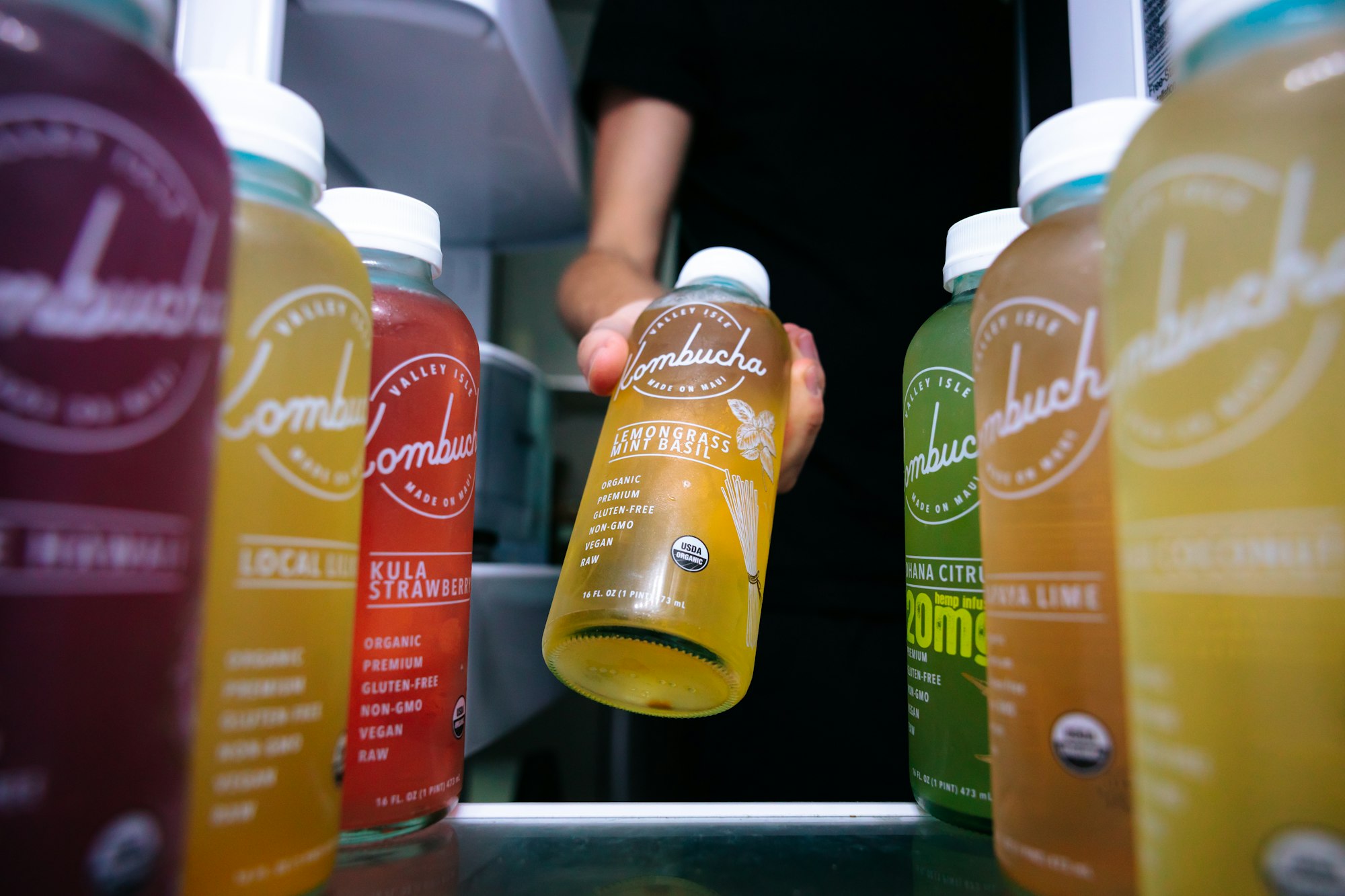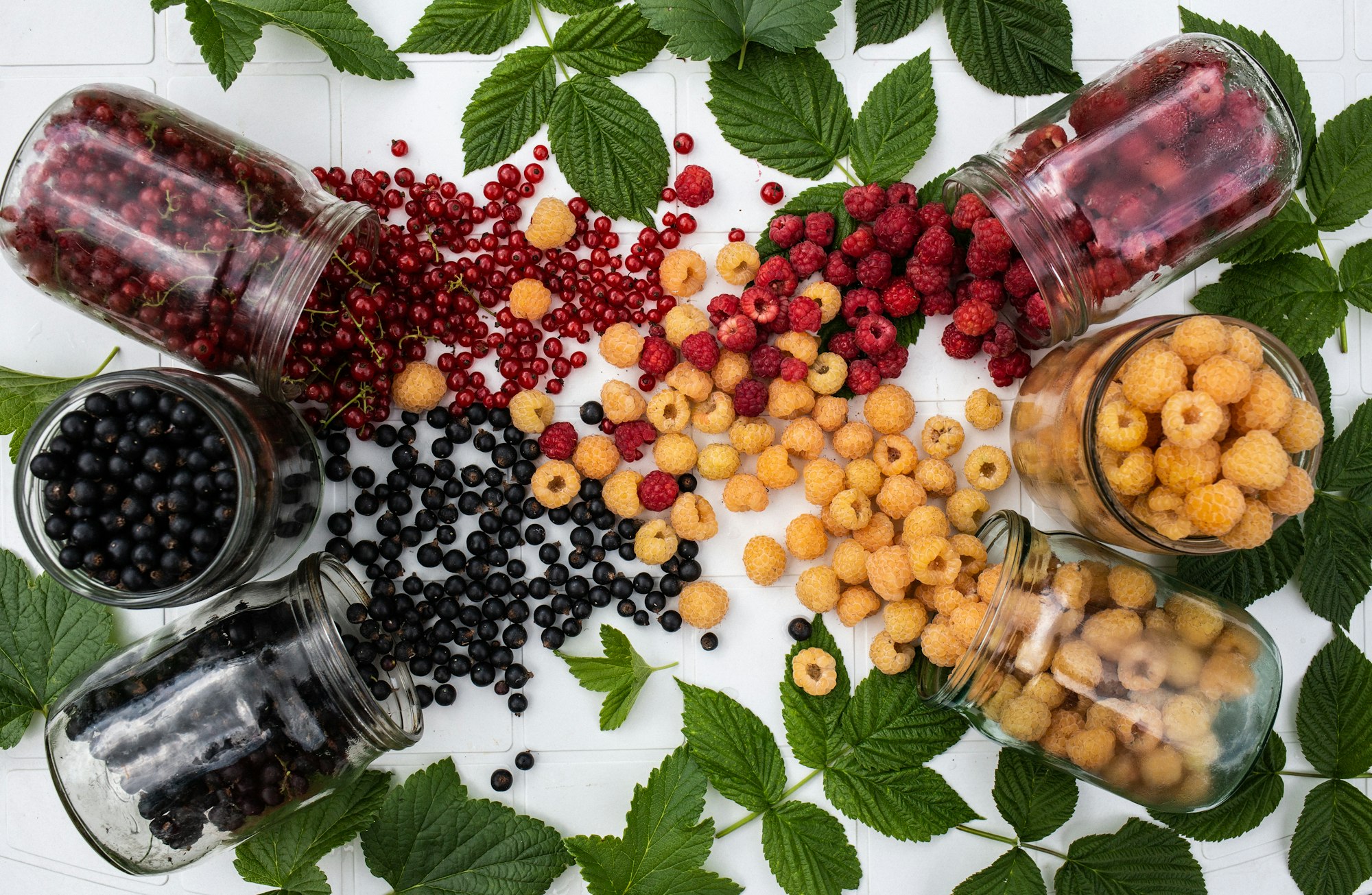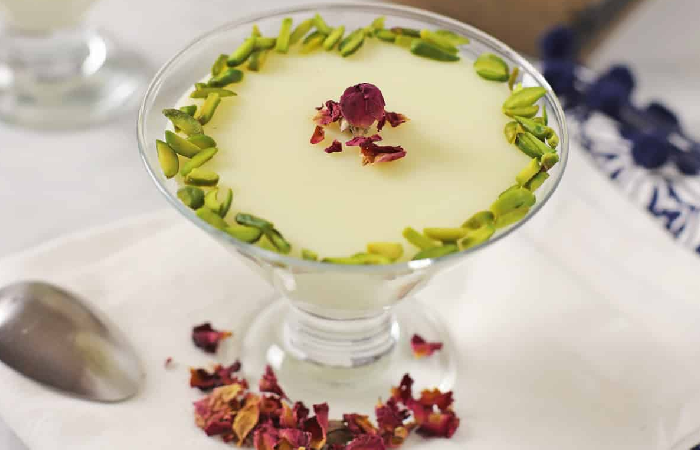How to Make Kombucha- Halal Perspectives, Benefits, and Risks

Kombucha is a fermented tea. It is made from black or green tea, SCOBY and sugar. It has a rich and intriguing history that matches its flavor. Kombucha has gained popularity because of its unique health benefits. It claims to cure problems from hair loss to cancer and AIDS. Let's understand the benefits of this super beverage and also learn its preparation.
Kombucha And Its Increasing Popularity
From ancient emperors to modern health enthusiasts, the history of kombucha portrays a never ending search for wellness and a desire for adventure.
The rise in popularity of kombucha can be attributed to a number of factors these Include:
- Health-conscious consumers
- Adventurous palates
- Ease of access.
Whether it's the gut-friendly fizz, the flavor explosion, or the convenient grab-and-go access at super markets, kombucha appears to be here to stay. It is bubbling its way into hearts of people all over the world.
According to the trade group, Kombucha Brewers International the kombucha industry increased from $1 million to $1.8 billion between 2014 and 2019. The overall number of brands has grown by around 30% every year over the last five years.
The global kombucha market is predicted to grow at a compound annual rate of 15.6% between 2022 and 2030, reaching USD 9.70 billion by 2030.

Lets Understand The Halal Status Of Kombucha
Islamic authorities have specifically declared the drink to be lawful. As a result, anyone who follows halal criteria can enjoy kombucha and all of its tremendous health benefits in a happy, healthy, and moral way.
-
Fermented beverage items having less than 0.5% alcohol/ethanol are considered halal as long as the method does not employ haram components and is medically safe.
-
Kombucha contains relatively little alcohol, Muslims consider it halal because the alcohol is formed as a byproduct of the tea's fermentation process.
-
This is a completely natural process that creates so little alcohol that it cannot be intoxicating.
Does kombucha contain alcohol?
Yes, but in very little amounts. When a drink has an ABV of less than 1.2%, it is considered 'non-alcoholic'. Since Kombucha has an ABV of 0.5% it is considered non-alcoholic.
-
The Halal certification authority considers commercially produced Kombucha Halal because it has an ABV of less than 0.5%.
-
All flavors of Remedy Kombucha, Remedy Sparkling Apple Cider Vinegar and Remedy Energy are certified Halal by the Al-Iman Islamic Society Inc.
Understanding Kombucha
Kombucha is a fermented beverage made with sweetened tea, a SCOBY (Symbiotic Colony of Bacteria and Yeast), and occasionally added fruits, herbs, or spices. The process of fermentation of produces organic acids, carbon dioxide, and a small amount of alcohol (typically less than 0.5%), resulting in its distinct tangy flavor and gentle fizz.
History Of Kombucha
- The origin of kombucha date back to northeast China, often known as Manchuria. According to legend, a physician named Dr. Kombu introduced the drink to Japan during this time.
- Kombucha's popularity spread to Russia and Eastern Europe through the Silk Route. It became a household beverage . It is also known by the names "tea mushroom" and "kvas."
- Kombucha's popularity also reached the Russian royal court. This is learnt through its mention in medicinal books and chronicles.
- After a period of relative obscurity, kombucha reappeared in Europe in the early twentieth century. This was because of interest people showed in its health advantages.
- Kombucha found a place among health-conscious communities in the United States who were seeking health care solutions.
- Kombucha's popularity skyrocketed in the 20th century. Bottled kombucha brands were launched. This jelled well with people who desired convenient and tasty choices.
Kombucha is now a global phenomenon. It has millions of fans now and a wide range of tastes and brands to choose from. It's story symbolizes a timeless pursuit of wellbeing and a desire for adventure.
As research into its potential health benefits continues, one thing is certain, kombucha's journey is far from over. It sure promises new chapters of innovation and delight to come in the years ahead.
Basic Ingredients And The Fermentation process
The basic ingredients of Kombucha are as follows:
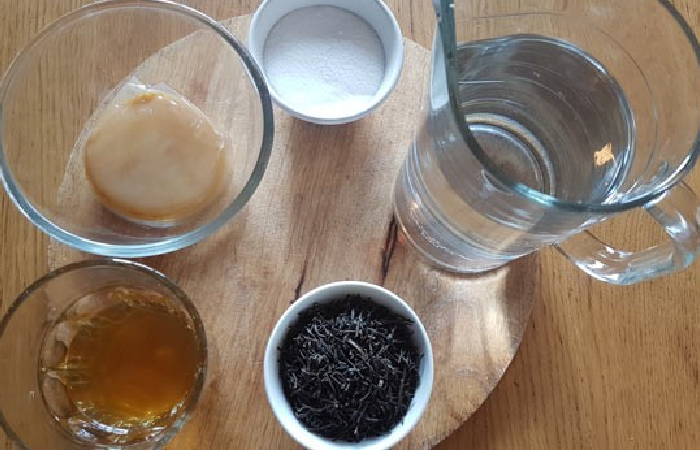
- SCOBY (Symbiotic Culture of Bacteria and Yeast)
- A gallon spring water
- Black tea or green tea (as per your preference)
- Sugar
- Fruit Juice (optional)
Fermentation Preocess:
Step 1: Brewing the tea
In a large saucepan, bring to boil one gallon of spring water. Put the tea bags in the boiling water and steep for 15 minutes. After 15 minutes, remove the tea bags and add the sugar. Stir vigorously to dissolve the sugar.
Step 2: Add the SCOBY
At this stage, let the tea cool to 75-80 degrees. Once the tea has reached the proper temperature, transfer it to a glass jug and add the SCOBY.
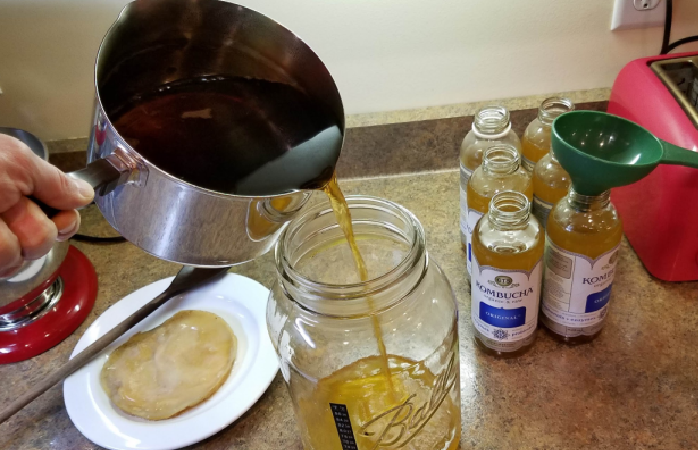
The bacteria and yeast will use sugar fermentation to convert the tea into kombucha. After adding the SCOBY, put the floating thermometer in the jug and wrap it in cheesecloth. Use a rubber band to hold the cloth in place.
Step 3: Fermentation
Place the jug in a slightly warm, dark place for 7-10 days. This will allow the fermentation process to occur. The SCOBY will grow in size, and after the recommended number of days, your beverage will be ready.

If you prefer a stronger taste, you can increase the amount of days. The longer you brew the drink, the greater its flavor.
Step 4: Remove the SCOBY
Now that the kombucha has been brewed, slice off the SCOBY and place it in a glass jug. Pour kombucha over the SCOBY until the liquid just covers it.
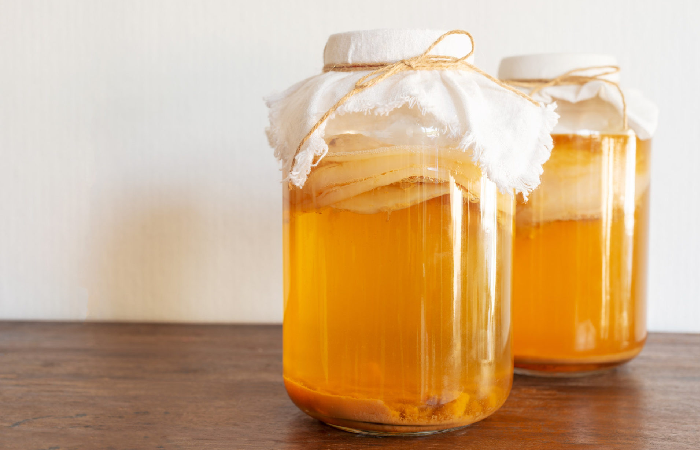
Cover the jug with cheesecloth and allow the SCOBY to settle. If you like the taste of the kombucha, pour it into sealed glass bottles and chill. After opening the seal, the drink will be fresh for 3-5 days.
Step 5: Flavoring Kombucha
Flavouring of Kombucha is as per the preference of the consumers. If you wish to give the beverage extra taste, add some fruit juice.
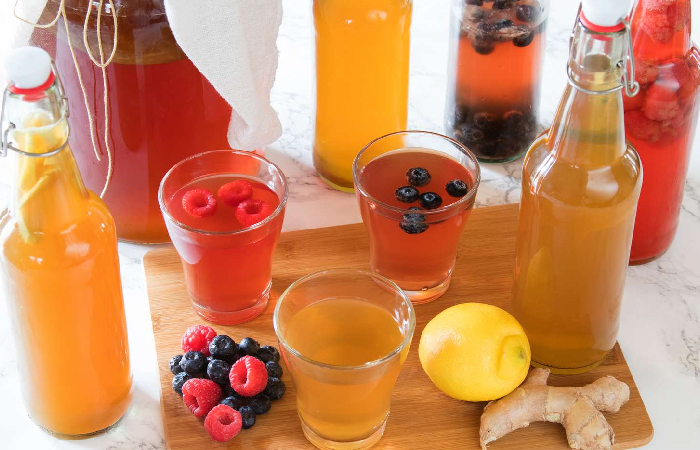
Stir thoroughly and pour the drink into the sealed bottles. Store them in a dark place for three days and allow the SCOBY do its work.
Step 6: Get immersed in the amazing flavor of raw kombucha
After the fermentation process is complete, filter off any excess SCOBY and store the drink in sealed bottles until ready to enjoy.
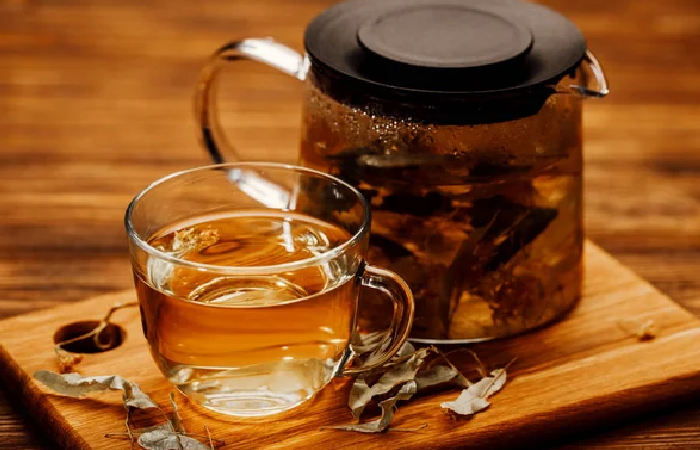
Raw kombucha's delicious taste will not only satisfy your taste buds, but it will also deliver plenty of health advantages to your body and mind.
Difference Between Kombucha And Other Fermented Beverages
Kombucha and kefir are renowned beverages of current genre which offers a variety of health benefits to users.
Both these beverages are made from microorganisms that function as microscopic factories. They undergo fermentation to produce beneficial nutrients with antibacterial and anticancer properties.
The main difference between these two drinks is the use of green or black tea in Kombucha and milk in Kefir.
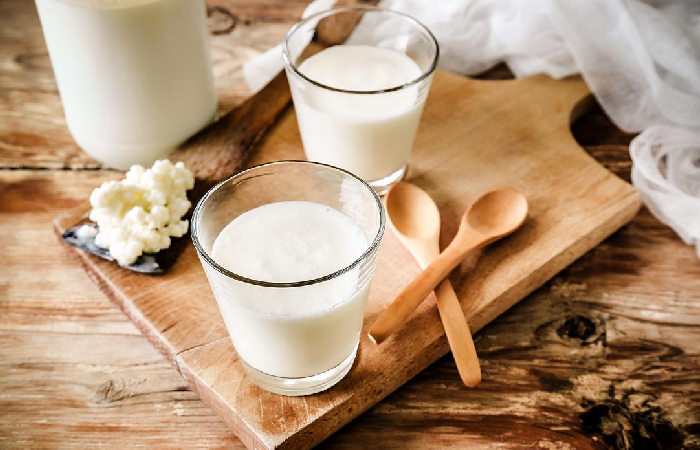
Both these beverages have probiotics, which are good for the gut.
Alcohol is also a fermented drink. Alcoholic liquids that are haram, are made using grapes that contain more sugar, resulting in a higher alcohol content. This is why wines with greater alcohol content frequently come from sunnier locations, where the grapes have better growth conditions for a sweeter taste.
Is Kombucha Halal?
As mentioned earlier the the Islamic Authorities consider Kombucha to be halal because of the permissible limits af alcoholic content in it. let's understand the islamic principles as regards to fermented drinks and the alcohol content in the drinks.
Islamic Principles On Fermentation And Alcohol Content
According to Surah Maidan Verse 90 and 91, the Quran mentions
Oh, you who believe! Intoxicants (all types of alcoholic beverages), gambling, Al-Ansab, and Al-Azlam (arrows used to seek luck or decision) are all abominations created by Shaitan. So, in order to be successful, avoid (absolutely all) of that (abomination).
Shaitan (Satan) merely tries to incite hostility and hatred between you through intoxicants (alcoholic drinks) and gambling, and to prevent you from remembering Allah and doing As-Salat (prayer). Will you not then abstain?.
-
According to Islamic beliefs, consuming food or beverages containing more than 0.5% alcohol is considered khamr, which is prohibited.
-
In Islam, alcohol is generated in various fruit items through fermentation processes such as takhammur (wine making) and takhallul (vinegar making). The fermentation process has an impact on the status of the food items, whether acceptable or forbidden.
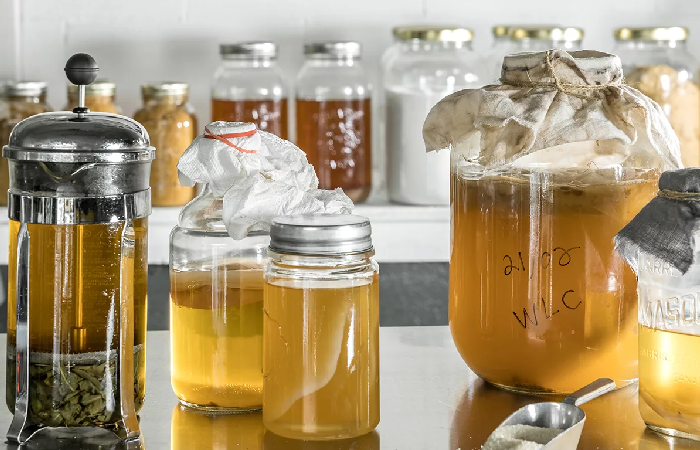
It is narrated by Ibn ‘Umar (may Allah be pleased with him) that The Messenger of Allah (blessings and peace of Allah be upon him) said: “Every intoxicant is khamr and every intoxicant is haraam.”
It is narrated from Jaabir ibn ‘Abdullah (may Allah be pleased with him) that the Messenger of Allah (blessings and peace of Allah be upon him) said: “Whatever intoxicates in large amounts, a small amount of it is haraam.” Abu Dawood and Tirmidhi
- Liquor is described in Islamic Law as any alcoholic liquid that can impair a person's mental clarity. According to a Hadith,
"whatever intoxicates in large quantities, then a small quantity of it is also forbidden."
Opinions Of Islamic Scholars And Halal Certification Authorities
Consuming alcoholic beverages or foods/drinks containing intoxicating components is banned in Islam. The majority of Islamic scholars agree that any beverage with an alcohol concentration greater than 0.5% is forbidden.
It is worth noting that many halal-certified kombucha brands analyze and monitor their goods to ensure they fulfill halal standards and follow particular alcohol content recommendations. Certain companies use pasteurization or longer fermentation times to reduce alcohol levels below 0.5%.
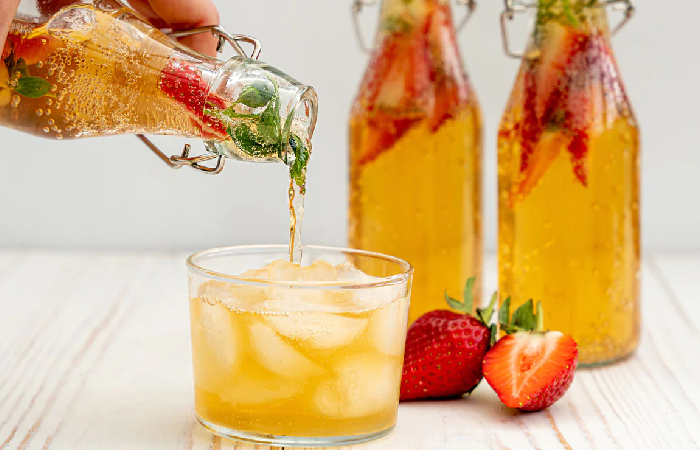
The Shia school of thought in Islam considers non-alcoholic fermented items to be generally lawful. However, whether Kombucha is halal or not is determined by its alcohol content. If the fermentation process produces more than a small amount of alcohol (often 0.1% or less), it is considered haram. As a result, Shia Muslims should only eat halal-certified Kombucha that contains little or no alcohol.
According to the Hanafi school of thought, Kombucha is Halal if it has no prohibited ingredients. It should not be fermented to alcoholic level. Kombucha with a short fermentation time and an alcohol content of less than 0.5% is safe to consume. However, before drinking Kombucha, check the ingredients and alcohol concentration to confirm that it adheres to Islamic dietary rules.
Guidelines For Ensuring Kombucha is Halal
The primary risk associated with kombucha is the alcohol created during fermentation. While the amount is normally modest (less than 0.5%), some stringent interpretations regard even trace amounts of alcohol as harmful.
-
Ensure that any added fruits, herbs, or spices are halal and did not come into contact with non-halal ingredients while processing.
-
Because of the slight alcohol concentration, different Islamic scholars may hold opposing views on kombucha's permissibility. It is recommended that you seek particular advice from a recognized scholar.
-
Look for halal-certified kombucha brands from trustworthy Islamic groups. This ensures that halal rules are followed throughout the production process.
Here Are A Few Halal Kombucha Brands:
- Remedy Kombucha offers a variety of halal-certified flavors. These include Raspberry Lemonade, Ginger Lemon, and Cherry Plum.
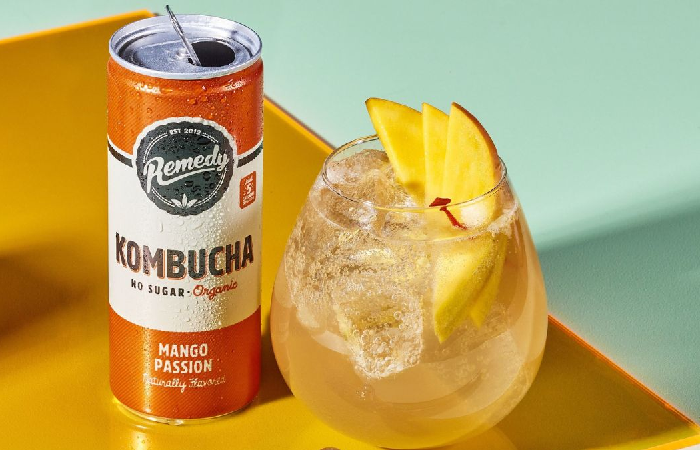
-
GT's Living Foods is a well-known firm that offers halal-certified kombucha flavors like as Original, Trilogy, and Gingerberry.
-
Health-Ade Kombucha produces organic, high-quality drink. Halal-certified products like Pink Lady Apple, Pomegranate, and Cayenne cleanse are available.

- Brew Dr Kombucha takes pleasure in producing kombuchas made entirely from raw materials. Their Classic Kombucha flavor is certified halal.

Health Benefits of Kombucha
Kombucha tea, has grown in popularity in recent years. It has health advantages because of the fermentation process which produces probiotics. Kombucha also have antibacterial properties.
Nutritional Components Of Kombucha
One 8-ounce (240mL) portion of kombucha contains 29 calories, 0g protein, 8g of carbs, and no fat. It contains B-complex vitamins, like thiamine and niacin.
The USDA provided this nutritional information.
Calories: 29
Fat: 0g
Sodium: 10 mg.
Carbohydrate: 8g
Fiber: 0 grams.
Sugars: 8 grams.
Protein: 0 grams.
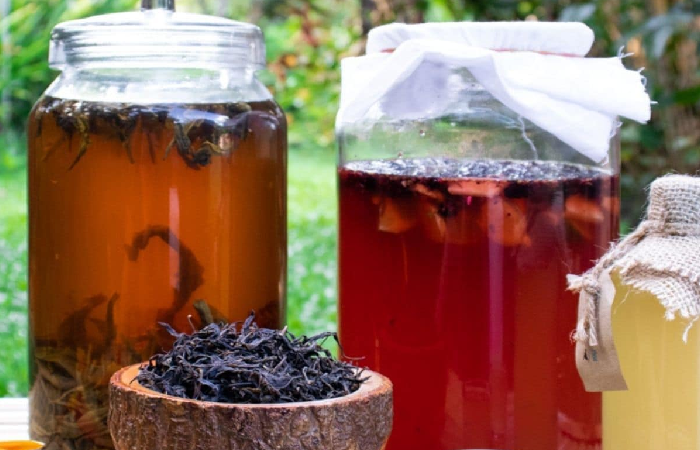
Health Benefits
Kombucha, which is brewed from tea, contains caffeine. The amount varies depending on the variety you like. It may also contain trace levels of alcohol as a byproduct of the fermentation process, as well as a range of phytochemical components derived from the tea (and, in some cases, juice) used to manufacture the beverage.
Contains Vitamins And Minerals
Kombucha contains trace amounts of vitamins and minerals produced when yeast breaks down sugars, including vitamin C and B vitamins such as B1, B6, and B12. Levels are likely to vary per product.
Reduces Oxidative Stress
Antioxidants prevent free radical damage induced by oxidative stress. Green tea, includes a type of antioxidant known as polyphenols, namely catechins. However, a variety of factors, like the tea used to manufacture the kombucha and the fermentation duration, can affect its antioxidant properties.
Anti Fungul Properties
Acetic acid is a byproduct of fermentation, and it is considered that this, along with other substances contained in green and black tea, may inhibit the growth of undesirable bacteria and yeast while boosting more helpful strains.
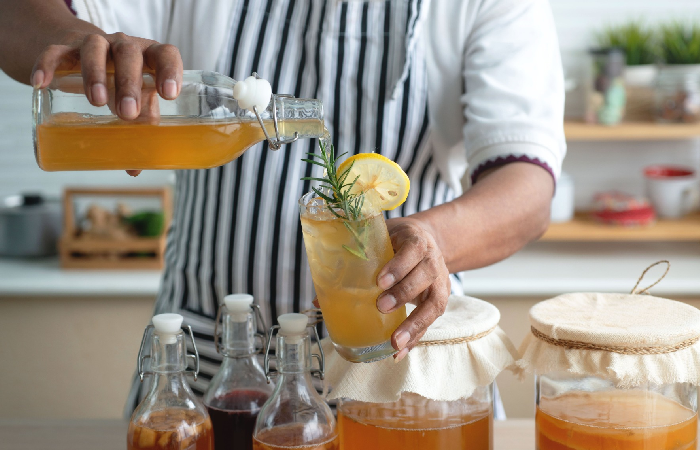
Manages Cholestrol
Animal studies suggest that eating kombucha may enhance cholesterol management and, when combined with the beneficial polyphenols found in tea, particularly green tea, may lower the chance of developing heart disease.
Probiotics and gut health
During fermentation, the SCOBY creates a variety of lactic acid bacteria and yeasts. These are widely associated with probiotic health. Lactobacillus, Saccharomyces, and Gluconacetobacter are some of the species.
According to studies, drinking kombucha may improve intestinal health by
- Enhancing the microbial activity in the gut
- Improving digestion
- Immunity boosting
- Reducing inflammation
An Islamic Perspective On Taking Care Of The Body
From an Islamic perspective, health is regarded as one of God's greatest benefits to humanity. It should be remembered that the greatest gift after belief is health, as described in the following Hadith:
The final messenger of God, Prophet Muhammad (pbuh), mounted the pulpit, grieved, and said,
"Ask Allah (swt) for forgiveness and health, for after being granted certainty, one is given nothing better than health."
It has been related that Prophet Muhammad (pbuh) said:
"No one will be allowed to move from his position on the Day of Judgement until he has been asked how he spent his life, how he used his knowledge, how he earned and spent his money and in what pursuits he used his health"
Various chapters and teachings in Islam encourage people to eat healthily and in moderation. God explicitly states in the Quran:
Eat the good things that We have given for you. (2:173) Eat only what is legal and healthy on the planet.(2:168)
A healthy nutritious diet must also be balanced, in order to maintain the balance that God has established in all things, as stated in the Quran:
And He enforced the balance. That you do not exceed the boundaries, but rigorously adhere to the balance and do not fall short of it. (55:7-9)
The Hadith of the Messenger of God prohibits overindulgence and food waste:
"No human has ever filled a container worse than his own gut. The son of Adam need no more than a few morsels of food to maintain his strength; hence, he should think that a third of his stomach is for food, a third for drink, and a third for breathing.
Islam strongly condemns the use of intoxicants such as alcohol and narcotics, and with good reason. The limited pleasure of such vices produces significant long-term harm to the mind, body, and social fabric of society.
Health Risks of Kombucha
Despite its health benefits, kombucha use can have certain drawbacks and pose health risks. According to the Centers for Disease Control and Prevention (1994), consuming four ounces of kombucha per day has no negative health effects. It is described as safe for human consumption following biochemical and microbiological studies.
Potential Side Effects And Health Risks
Kombucha consumption is only harmful if not properly prepared, and people with pre existing problems should avoid it because it might cause metabolic acidosis.
Because kombucha culture contains acetic and lactic acids, its pH is acidic, which helps it protect itself by limiting the growth of hazardous microbes.
-
If you have a weakened immune system or are on any medications that are sensitive to stomach pH levels, avoid kombucha because the tea is acidic.
-
People with diabetes should drink kombucha with caution. Caffeine-sensitive individuals should also proceed with caution.
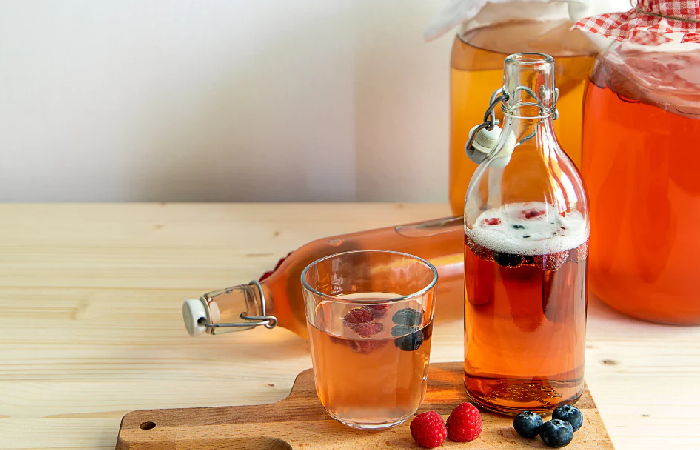
-
If raw kombucha is permitted to ferment, the alcohol content can reach levels comparable to certain beer. That could be a difficulty for someone trying to avoid consuming alcohol.
-
There have been instances of liver damage and metabolic acidosis in people who consumed a considerable amount of kombucha in a short period of time.
-
But these patients also had other illnesses that rendered them more vulnerable to acidosis.
-
However, if you have any medical concerns or are pregnant, you should see your doctor about whether kombucha is healthy for you.
The Risk Of Alcohol Content In Kombucha
Homemade kombucha contains up to 3% alcohol. However commercial beverages cannot contain more than 0.5% alcohol.
Making kombucha at home is a low-cost and popular option that allows you to customize the ingredients. But it must be done accurately and carefully.
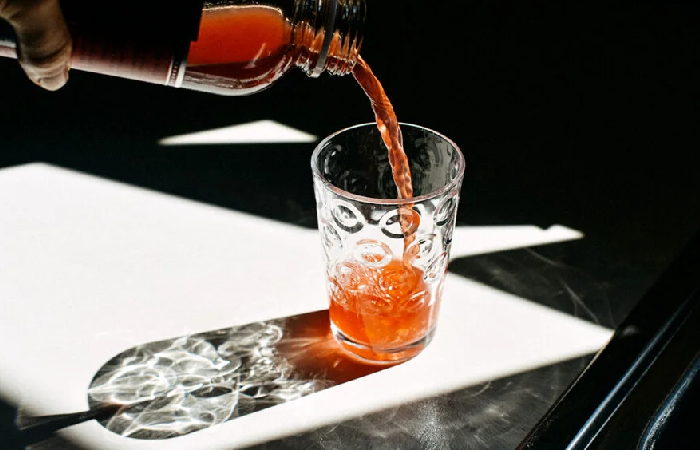
If Kombucha is over-fermented or tainted, it can cause significant disease, even death! Depending on the fermentation process and temperature, homemade kombucha can contain more than 1% ABV. Therefore, it is vital to monitor and regulate the fermentation process.
So, either get it from a reputable source or prepare it yourself. Other important point is to drink it fresh and store it in fridge when not in use.
How To Make Kombucha At Home
Carbonated drinks are often made using sugar, carbonated water, and artificial tastes; however, kombucha is actually alive. Its carbonation is derived from fermentation and natural aromas. It only takes a single sip of authentic kombucha to notice the difference.
Learning how to make kombucha is an adventure. You will not only have your own microbiological project, but you will also have control over the ingredients and flavours used.
Step-By-Step Guide To Making Halal Kombucha
You'll need five components.
Ingredients include water, tea, sugar, scoby, and starter liquid.
Water:
You must use non-chlorinated water. The chlorine in the water can kill the microorganisms we wish to see grow.

Tap water contains chlorine, which a standard water filter cannot remove. To remove the chlorine, boil it and then refrigerate it. You may simply place it in a basin overnight to let the chlorine evaporate naturally.
Tea:
Black tea is considered the best since it contains nutrients that the scoby prefers. It can give a robust, delicious flavor, but many people like to blend teas, such as half black and half green or white tea. You can use either teabags or loose tea. Teas with additional oils, such as Earl Grey, should be avoided.

-
It is also possible to use teas that are not derived from the tea plant, such as rooibos, chamomile, chicory root, hibiscus, nettle, raspberry leaf, yerba mate, and so on.
-
It is best to preserve a fourth of the tea content as black tea, either in each or every few batches. Because you will be nurturing a living organism, you should ensure that it has the optimum environment to develop, thus use organic tea wherever feasible.
Sugar:
Ordinary cane sugar is commonly used. Less refined sugars will work but may result in flavor alterations. It is impossible to make kombucha without sugar.
-
Sugar provides the food that the yeast and bacteria require to proliferate, form a new scoby, and convert sweet tea into acids, vitamins, and carbonation.
-
Much of the sugar that remains in kombucha after fermentation has already been converted from table sugar (sucrose) to fructose and glucose.

-
Bacteria then convert it into beneficial acids. After this the enzymes break down the sugars, further lowering the amount. Using too little sugar may starve the scoby.
-
The longer kombucha is fermented, the less sugar remains. Artificial and sugar alternatives will not work since they feed the germs and yeast.
-
Honey should not be used since it introduces new yeast and bacterium cells, though there is a special form of kombucha called jun that thrives on honey.
Scoby:
A scoby should come from a good source and not have been dried or stored in the fridge. The size does not have to be exact.
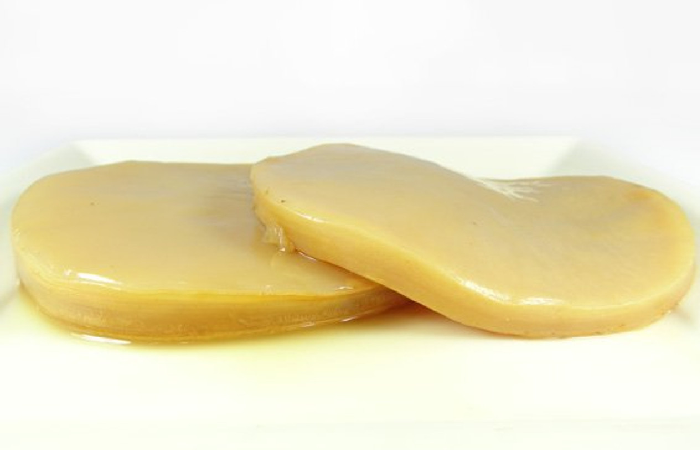
Use a small one for a small batch and a medium one for a medium batch. The shape is irrelevant because a new scoby will form at the top of the vessel.
Starter Liquid
The starter liquid is just as necessary as the scoby. In fact, a brew with beginning liquid and no scoby is more effective than one with scoby and no starter liquid, but having both is always preferable.
When starting a new batch of kombucha, some starter liquid is required, often taken from the top of the previous brew and accounting for 10% of the new batch's volume. This reduces the pH of the tea.
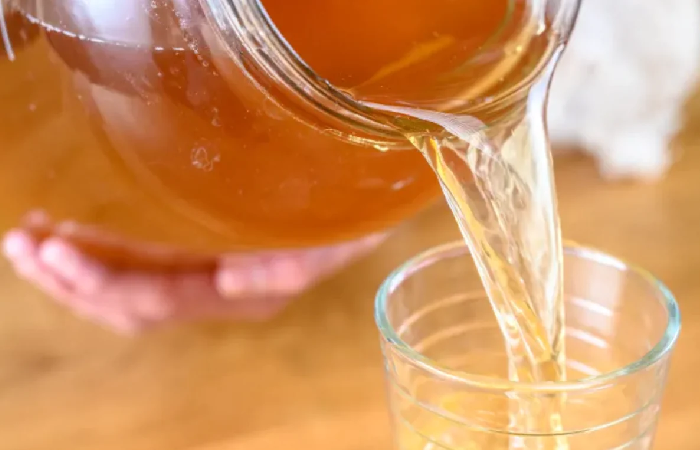
kombucha has a pH of 3.5 to 2.5, while tap water has a pH of roughly 7. The lower the pH number, the more acidic the solution. However, there is no need to measure the pH because you can taste the acidity. The starting liquid protects the sweet tea from dangerous bacteria such as mold and kahm yeast.
To keep the kombucha in a healthy balance, take the starter liquid from the top of the previous brew, where bacteria thrive, rather than the bottom, where yeast predominates. The addition of the starting liquid accelerates fermentation and shortens the brewing cycle.
Quantity Of Ingredients Needed
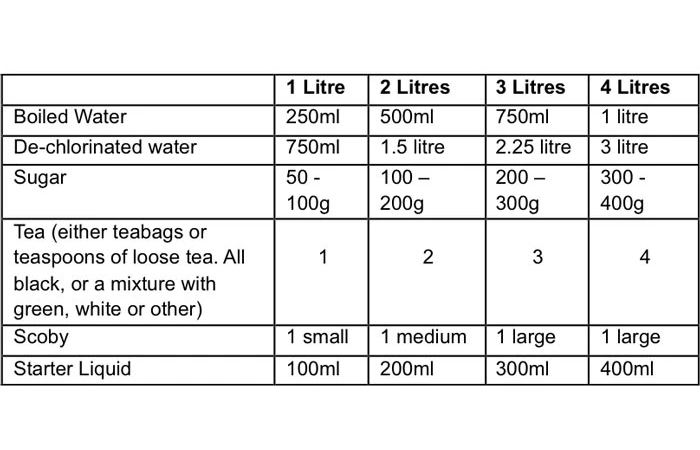
You can increase the quantity subsequently for increased quantities of Kombucha.
Preparation:
- In a saucepan, bring a quarter of the total water to a boil, then remove from the heat and add the teabags and sugar, stirring briefly to dissolve the sugar and leaving for 6-10 minutes to brew.
- Remove the teabags from the solution, but do not compress them, as this can make the drink bitter.
- Add the remaining amount of cold, dechlorinated water. This will ensure that the solution is not too hot, as temperatures above 35°C will kill the scoby.
- Combine the scoby and the starting liquid it has been sitting in. There should be at least 5 cm of space at the top to allow for fermentation activity and scoby growth.
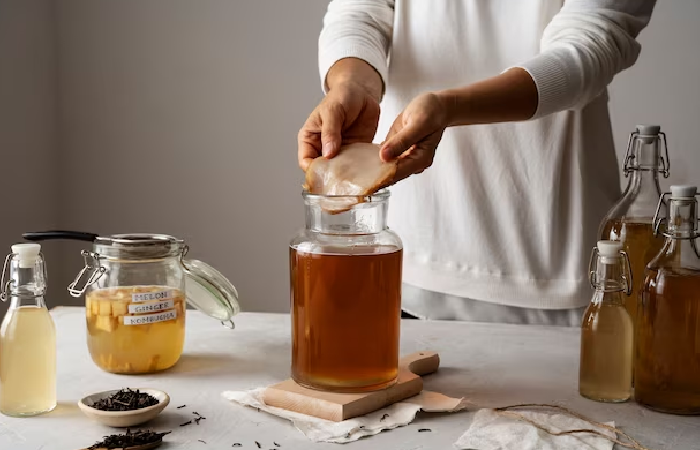
- To keep dust and fruit flies out, wrap the jar in a cloth or paper towel and secure it with an elastic band. The jar should not be closed since the scoby needs to breathe. Label the container with the date and the tea mix used. Masking tape is ideal for this because it peels off easily.
- Allow to ferment for 6-9 days at room temperature, away from radiators, ovens, and direct sunshine - a kitchen work surface works nicely. It does not require complete darkness; a little light is OK as long as it is not direct sunlight. Do not store it in a cupboard because air circulation is critical.
- Following this stage, it should be ready to start a secondary fermentation.
Temperature Care:
Normal room temperatures are OK (above 21°C), but the ideal temperature range is 26-27°C. Fermentation slows at 18°C, but above 30°C, the yeast proliferates, resulting in increased alcohol production. If you want to get the desired temperature, you will need to use a heating method. The best option is a heating belt from a homebrew shop that wraps around the vessel and heats from all sides. Heating from the bottom can make the yeast overly active.
When Is Kombucha Ready?
There is no particular time when we can say it is ready. Kombucha begins as a sweet beverage, but as it ferments, it becomes more acidic, so it is up to personal preference when it reaches the level of acidity you prefer.
After six days, you can begin sampling the kombucha daily to watch how it changes. If it's too sweet, just leave it for longer. For this reason, some people would regard a batch to be exactly fine after six days, whilst others may go for nine or twelve days.
Primary Fermentation And Secondary Fermentation
Primary Fermentation: The first step is primary fermentation, which is all that is required if you prefer the original kombucha flavor and a modest amount of carbonation.
Secondary fermentation : Secondary fermentation is the second stage, in which the kombucha ferments in a bottle. This is preferable if you want to add additional flavors or have a higher amount of carbonation.
Fruit Options
- Strawberries, raspberries, and blackberries, Stone fruits such as cherries, peaches, and plums can be added to the drink.
- They will turn the Kombucha a gorgeous color in a day or two.
- Avoid raisins, oily fruits, apricots, and anything with sulphur dioxide.
- Frozen fruit works well because the freezing process creates ice crystals.
- This breaks up the fruit's cell structure, allowing the kombucha to absorb more flavor and color. You might also use juice or purée.
- Beetroot Carrot Cucumber Ginger and garlic could also be used.
- Other options include brewed coffee, cacao powder, maca powder, coconut water, rosehips, rose petals, and tamarind.
Points To Remember
- Keep everything clean, and always rinse thoroughly after cleaning.
- Use a glass or food-safe ceramic vessel that can withstand acid.
- Avoid using plastics.
- Stainless steel can be used, but only grade 304 or higher.
- Use water that is devoid of chlorine.
- Never use sweeteners; instead, use regular sugar.
- Use good-quality tea, preferably organic.
- Use starting liquid from the top of the previous batch.
- Ferment in a warm place (above 21°C but less than 30°C).
- To keep fruit flies and dust out, cover securely with a towel
- Keep extra scobys in a scoby hotel as backup.
- Discard any moldy batches, including the scoby and liquid.
- Always bottle kombucha after the primary fermentation has taken place.
- Choose pressure-resistant bottles, such as flip-top bottles and beer bottles.
- Leave enough headspace at the top of the bottle—about four fingers' worth.
Preferred Dose/Usage
-
Kombucha contains live bacteria, therefore it is recommended that you start slowly while your digestive system adjusts. Start with about 100ml per day for the first week and gradually increase from there.
-
It will not be suitable for everyone, just like any other beverage or food. It is not recommended for persons who are histamine intolerant, however it ultimately depends on the individual.
Problem With SCOBY Not Growing
-
A new scoby should form on top of the vessel. It will appear see-through or moldy at first, but after a while, it should solidify into a lovely creamy white disc.
-
If this does not occur, it could be that the temperature was too low, the initial scoby was too small, or there was insufficient starting liquid.
-
Scobys can be harmed if they are stored at too low a temperature, such as in a fridge, or if they are exposed to temperatures of 40°C or higher.
Storing Kombucha
Store it in the refrigerator, preferably below 40°F (4°C).
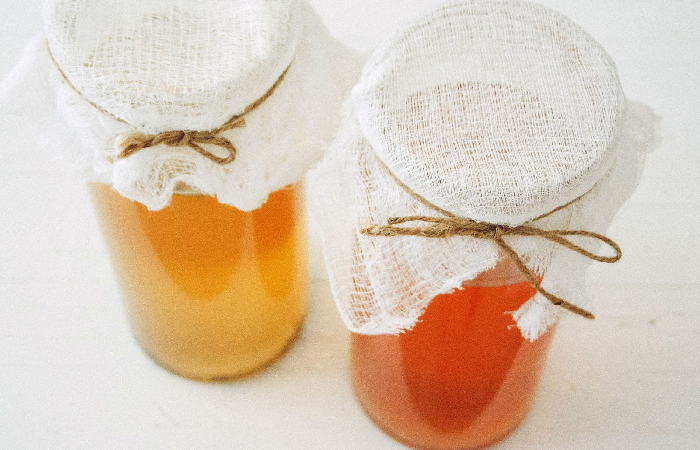
This temperature slows fermentation, preserving flavor and preventing overfermentation, which can cause vinegar-like acidity and unwanted pressure buildup in bottles.
-
Opt for glass bottles or jars for storage. Plastic can affect the taste and leach harmful chemicals into the kombucha over time.
-
Use bottles with airtight lids or secure lids on jars to prevent oxidation and contamination. This helps maintain the fizz and protects against unwanted bacteria or mold growth.
-
When transferring kombucha to bottles, allow 1-2 inches of headspace at the top. This makes room for the natural carbon dioxide created during fermentation, which prevents explosions.
-
While freezing appears to be a smart idea for long-term storage, it actually destroys the kombucha. The freezing and thawing process affects the texture and flavor, producing a mushy, unappealing drink.
-
Label your bottles with the brewing date to keep track of their freshness.
-
Although not necessary, keeping kombucha out of direct sunlight can help prevent flavor loss.

Conclusion
Kombucha is considered halal by Islamic Society as the percentage of alcoholic content is with in permissible limits. You can make informed kombucha consumption decisions by taking into account both halal guidelines and your own personal health needs.
Remember:
- Consult a reputable Islamic scholar for precise advice on its permissibility under your interpretation.
- Choose brands with low alcohol content and halal certificates for peace of mind.
- Be cautious of your health and take kombucha in moderation, just like any other meal or beverage.
Additional Resources
Links to Halal certification Guidelines
https://iaf.nu/partner_organization/ihaf-international-halal-accreditation-forum/
https://www.worldhalalcouncil.com/
https://www.oic-oci.org/
http://www.islam.gov.my/
https://halalmui.org/en/about-us/
https://eservices.esma.gov.ae/
https://ifanca.org/
https://ifanca.org/halal-consumer-magazine/
Articles and Fatwas on Fermented Foods
Due to the trace amount of alcohol created during fermentation (usually less than 0.5%), opinions on kombucha's permissibility differ.
-
Some experts consider it Halal because of the low alcohol level, while others advise against it owing to the overall restriction on intoxicants.
-
Seeking advice from a scholar versed with your particular school of thought and interpretation is essential for making an informed decision concerning kombucha.
-
Many Islamic institutions keep an online database of Fatwas issued by their scholars. Searching for fermented food-related questions can yield useful information.
https://www.fatwaislam.com/fis/
https://www.amjaonline.org/fatwa/en/
https://www.islamweb.net/en/
https://en.wikipedia.org/wiki/List_of_fatwas
Further Reading on Health And Nutrition From an Islamic Perspective
- Muhammad Ali al-Hashimi's The Islamic Guide to Food and Nutrition
- Healing with the Prophet's Medicine by Sheikh Abdullah al-Harriri
- Hakim Muhammad's Complete Book of Islamic Healing states
FAQ's
-
Does Kombucha help in weight loss?
Yes, It increases the metabolic activity of your body, there by the body burns calories at a faster rate and this can aid in weight management. -
Is homemade Kombucha Halal?
It depends on the duration of fermentation. Do not over ferment, else the ethenol percentage will inceaase and can even make it haram. -
Is Kamboucha used in other things apart from drinks?
yes, ANDALOU cleansing gel contains citrus Kombucha. -
Is kombucha Haram?
Kombucha is haram if its alcohol content goes beyond the permissible limit of 0.5%.

